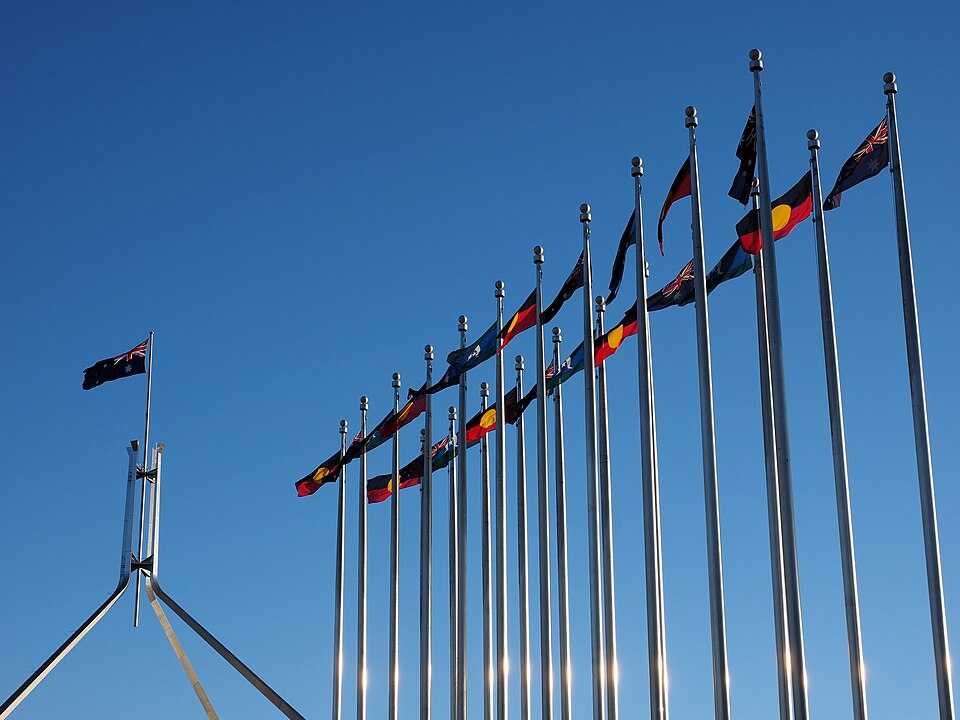This week in Australian foreign affairs: Government budget supports increased funds for foreign policy; further sanctions against Iranian senior officials; Wong on UN General Assembly Resolution for Palestinian membership; ongoing committement for Ukrainian duty-free access to Australian goods, and more.
On 14 May, Foreign Minister Penny Wong joined Minister for Trade and Tourism Don Farrell and Minister for International Development and the Pacific Pat Conroy in announcing Australia’s budget for foreign affairs. Entitled “Securing Australia’s Future in the World,” the Albanese government is seeking “the reversal of the long-term reduction in diplomatic resources and increased diplomatic efforts in areas of core national interest.” The 2024-25 Budget will include more than AUD$227.8 million “for investing in Australia’s communications infrastructure and overseas property.”
The Government will also commit a further AUD$206.5 million to broader regional security and resilience needs, including sustaining Australia’s investment in regional relationships in the Pacific. There is further commitment to implement “Invested: Australia’s Southeast Asia Economic Strategy to 2040,” in addition to “a Southeast Asia Investment Financing Facility to provide up to $2 billion in loans, guarantees, equity and insurance to catalyse Australian trade and investment in the region.”
A further AUD$26.4 million will be added to sanctions enforcement. Meanwhile, AUD$29.9 million will be committed to a “new Digital Trade Accelerator Program to provide businesses with new, secure digital access to important trade data, with enhanced risk assessment so trade flows easier across our borders.” The Budget will also “provide $10.9 million to expand the successful Go Global Toolkit, which offers online export information and advice to help Australian businesses expand overseas and make use of our free trade agreements.”
Addressing Australian markets effected by China’s sanctions, the Albanese Government has earmarked AUD$2 million for “Austrade to provide additional surge support for affected Australian agricultural exporters to re-establish commercial connections in China and continue to diversify into other markets.” The Government will also “provide ongoing funding for China’s Approved Destination Status scheme, which enables guided Chinese group travel to Australia operated by Australian providers. This measure will support the ongoing return of Chinese visitors and provide greater certainty to Australia’s tourism sector as it continues to grow into the future.”
Further commitment was made to ongoing “support for Ukraine’s sovereignty in the face of Russia’s illegal invasion. The Government will sustain Ukraine’s duty-free access into Australia for a further two years, until July 2026, to support Ukraine’s economy.” Australia will also expand the “Australia-India Business Exchange, helping even more Australian businesses benefit from new trade and investment opportunities with India and across South Asia.”
On 14 May, Wong announced sanctions on an additional five Iranian individuals and three entities, in response to Iran’s destabilising behaviour. The senior officials sanctioned “include Iran’s Defence Minister, Mohammad Reza Ashtiani, and the Commander of the Islamic Revolutionary Guard Corps’ (IRGC) Qods Force, Brigadier General Esmail Qaani,” as well as “businesspeople and companies that have contributed to the development of Iran’s missile and Unmanned Aerial Vehicle (UAV) programs.” The media release outlined further targeted entities including the IRGC Navy, “which seized an Israeli-linked (Portuguese-flagged) civilian vessel in international waters on 13 April 2024. Australia continues to call for the immediate release of the ship and its crew.” These sanctions bring the total to “90 Iranian-linked individuals and 100 Iranian-linked entities.”
At a press conference in Adelaide on 11 May, Wong discussed the UN General Assembly vote on Palestinian membership. Australia voted in favour of a resolution which would increase the Palestinian authority’s membership rights within the Assembly and “reaffirm the international community’s unwavering support for the two-state solution of Israel and Palestine.” The resolution does not grant Palestine membership, but rather encourages a membership process to begin once peace has been created. Wong stated that “there is no role for Hamas in a future Palestinian state,” and affirmed the government’s position that the Palestinian Authority is the right authority to take up “responsibilities over a unified West Bank in Gaza.” Wong further stated: “We want to see a Palestinian governing authority that is committed to peace, that disavows violence and is ready to engage in a meaningful political process. We want to see a commitment to peace in how the Palestinian Authority leads its people. We also know that the final status of key issues, such as Jerusalem and the final territory of a Palestinian state should be defined through negotiations.”
Dr Adam Bartley is the managing editor for AIIA’s Australian Outlook and weekly columnist for The Week in Australian Foreign Affairs. He is a former Fulbright Scholar and resident fellow at the Elliot School for International Affairs, the George Washington University. Adam also has positions as post-doctoral fellow at the Centre for Cyber Security Research and Innovation RMIT University and as program manager of the AI Trilateral Experts Group. He can be found on Twitter here.
This article is published under a Creative Commons License and may be republished with attribution.



